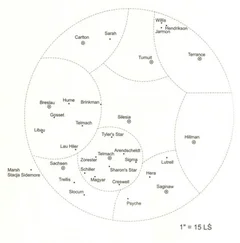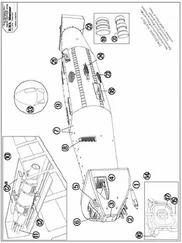“All right, people,” Colonel Tchaikovsky’s voice came over the Battalion command net from Unit 28/G-740-GRG. “We’re down, we’re in one piece, and we know where the Dog Boys are. And, unfortunately, we don’t have a lot of time. Commodore Selkirk is still wading into them, but it doesn’t look good for his task force. So we have to break into the Dog Boy position before any of their starships get loose and turn up to start dropping missiles on our heads as we advance. That’s going to limit our tactical options, and we have to assume the Dog Boys will manage to localize us and bring us under fire before we get into attack range. Gregg is loading movement orders to your Bolos now, and General Hardesty’s Marines will conform to our movements.”
Maneka watched the intricate pattern of lines and arrows representing the movement of the Battalion and the four Mark XXVII reconnaissance Bolos of the attached 351st Reconnaissance Company appeared on her secondary plot. The Battalion had dropped well within the Melconians’ theoretical engagement envelope, but the combined destruction of the warships which had been giving them firepower support and the loss of their orbital reconnaissance platforms had at least temporarily blinded the Puppies. No one could hit what they couldn’t see, so until the Melconians could positively locate the Battalion, all their firepower was useless. Which, of course, explained the drones Benjy and Allen had knocked down.
Colonel Tchaikovsky’s Bolo, Gregg, was feeding the Battalion’s movement plan simultaneously to the Marines, Maneka knew, and watched the blue icons of the Ninth Division flowing into formation behind the Battalion. Well behind the Battalion. Their infantry carriers and light supporting Whippet tanks, unlike those used by the Melconians, were all counter-grav supported, with a sprint speed of well over five hundred kilometers per hour. They would lie back, far enough to stay clear of the tornado of fire the Battalion could expect to draw as it advanced against the Melconian position.
If the Battalion succeeded in breaking that perimeter, the Ninth would come screaming in behind them, and Maneka had a very clear mental image of what the heavily armed Marine troopers in their individual powered combat armor would do to the Puppies if they could ever get to grips with their more lightly armored infantry adversaries. But unless the Battalion could open a breach for them, any attempt by the Marines to close with the enemy would be suicidal. So if the Battalion failed, instead of racing to exploit success, the Ninth’s troopers would use that same speed to fall back to the Chartres refugee centers where they might at least hope to kill a few more Melconians before the Puppies’ combat mechs ground them into the mud.
“All right, people,” Colonel Everard Tchaikovsky said as the final movement orders were acknowledged by all units. “Gregg estimates ninety-seven minutes to contact with the enemy. Let’s go.”
Green, rolling woodland spread out before Maneka in the panoramic view from Benjy’s forward optical head as the Battalion thundered towards the enemy. At least some of the Puppies’ recon drones had lasted long enough to spot them now, and she felt her hands sweating, the dryness in her mouth, as the first Melconian long-range fire screamed towards them.
She tried not to think about the odds. Sixty Surturs and twice that many Fenrises would have been heavy odds for a battalion of modern Bolos; for the Thirty-Ninth, they were impossible, and every human and Bolo in the Battalion, from the Colonel down, knew it.
“Melconian warships are entering range of the planet,” Benjy announced, and Maneka responded with a jerky nod.
Commodore Selkirk’s task force had paid the price of its gallantry. Not a single one of his ships had survived, but they’d ripped the guts out of the Melconian fleet before they died. None of the Puppy battleships or battlecruisers remained. Neither did any of their heavy cruisers, but nine light cruisers and eleven destroyers had been screaming towards Chartres at maximum for over twelve minutes now. She’d hoped the Battalion would win the race, get to grips with the Puppies’ ground forces before their surviving fleet units could intervene, but the numbers blinked on Benjy’s plot in grim confirmation that they would not.
The missile batteries the Melconians had dug in at the heart of their ground enclave vomited fire, and high-trajectory missiles rained down on the Battalion. More fell like cosmic flails, fired from the approaching warships to support the ground-based systems. Their flight profiles gave the Battalion easy intercept solutions, but they’d never actually been intended to get through in the first place. Their function was solely to saturate the Bolos’ defenses while the real killers broke through at lower altitudes.
“Remote platforms report cruise missiles launching all along the Enemy front,” Benjy’s resonant baritone told her. “Current estimate: approximately four thousand, plus or minus fifteen percent.”
“Understood,” Maneka rasped tautly.
“Colonel Tchaikovsky advises us that Enemy cruisers and destroyers are altering course. On the basis of their new heading and speed, I estimate a probability of 96.72 percent that they will endeavor to enter energy range of the Battalion simultaneous with the arrival of the low-altitude missile attack.”
“You’re just full of good news this afternoon, aren’t you?” she responded, baring her teeth in what might charitably have been called a smile.
“I would not call it ‘good,’” Benjy replied, with one of his electronic chuckles. “On the other hand, the Enemy’s obvious desire to mass all available firepower at the earliest possible moment does offer us some tactical advantages, Maneka.”
“Yeah, sure it does.”
She shook her head.
“I am serious,” the Bolo told her, and she stopped shaking her head and looked up at the internal visual pickup in disbelief.
“Just how does their piling even more firepower on top of us improve our chances of survival?” she demanded.
“I did not say it would enhance our survival probability. I merely observed that it offers us certain tactical advantages—or openings, at least—which we could not generate ourselves,” the Bolo replied, and there was more than simple electronic certitude in its voice. There was experience. The personal experience of his hundred and twenty-six years’ service against the enemies of mankind. “If their warships had opted to remain at extended missile ranges, rather than bringing their energy batteries into play, they would have remained beyond the range of our energy weapons. As it is, however, analysis of their new flight paths indicates they will enter their own energy weapon range of the Battalion 16.53 seconds before the arrival of their ground forces’ cruise missiles.”
Maneka Trevor’s blue eyes widened in understanding, and the Bolo produced another chuckle. This one was cold, without a trace of humor.
“They’re giving us a shot at them before the missiles reach us?” she asked.
“Indeed. They have clearly attempted to coordinate the maneuver carefully, but their timing appears inadequate to their needs. Unless they correct their flight profiles within the next thirty-eight seconds, the Battalion will be able to engage each warship at least once before their cruise missiles execute their terminal maneuvers. If they had been willing to wait until after the initial missile attack before closing, or even to remain permanently beyond Hellbore range, they would eventually have been able to destroy the entire Battalion with missiles alone.”
“Instead of giving us the opportunity to take out their orbital fire support completely!” she finished for him.
Читать дальше












